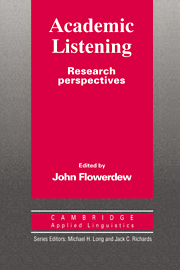Book contents
- Frontmatter
- Contents
- List of contributors
- Series editors' preface
- Acknowledgments
- Introduction
- I BACKGROUND
- II THE SECOND LANGUAGE ACADEMIC LISTENING PROCESS
- Chapter 2 Expectation-driven understanding in information systems lecture comprehension
- Chapter 3 The effects of rhetorical signaling cues on the recall of English lecture information by speakers of English as a native or second language
- Chapter 4 Second language listening comprehension and lecture note-taking
- Chapter 5 On-line summaries as representations of lecture understanding
- III DISCOURSE OF ACADEMIC LECTURES
- IV ETHNOGRAPHY OF SECOND LANGUAGE LECTURES
- V PEDAGOGIC APPLICATIONS
- Conclusion
- Index
- Subject index
Chapter 4 - Second language listening comprehension and lecture note-taking
Published online by Cambridge University Press: 05 October 2012
- Frontmatter
- Contents
- List of contributors
- Series editors' preface
- Acknowledgments
- Introduction
- I BACKGROUND
- II THE SECOND LANGUAGE ACADEMIC LISTENING PROCESS
- Chapter 2 Expectation-driven understanding in information systems lecture comprehension
- Chapter 3 The effects of rhetorical signaling cues on the recall of English lecture information by speakers of English as a native or second language
- Chapter 4 Second language listening comprehension and lecture note-taking
- Chapter 5 On-line summaries as representations of lecture understanding
- III DISCOURSE OF ACADEMIC LECTURES
- IV ETHNOGRAPHY OF SECOND LANGUAGE LECTURES
- V PEDAGOGIC APPLICATIONS
- Conclusion
- Index
- Subject index
Summary
Abstract
This study looks at the relationship between second language learners' notes taken while listening to audiotaped lectures and the learners9 success on two different types of comprehension measures. A review of hi and hi literature on the effects of taking notes and retaining notes on students' recall of lecture information reveals several factors as important contributors to successful recall, such as quality of notes, and training in note-taking. In this study, the effect on comprehension tests of the availability of notes taken, and the quality of hi learners' notes, was studied. Both multiple-choice and cloze listening comprehension measures were employed. Results indicate no favorable role for retaining or not retaining notes on short-term recall success, but complex relationships appeared between measures of lecture note quality and successful recall.
Introduction
The study of L2 lecture comprehension involves a number of important research questions. A considerable number of recent L2 studies have dealt with the analysis of lecture structure and its effect on L2 learners' comprehension, analyzing native speaker lecture style as well as nonnative speakers' oral skills and comprehensibility (e.g., Chaudron and Richards 1986; Chaudry and Astika 1991; DeCarrico and Nattinger 1988; Tyler, Jefferies, and Davies 1988; Williams 1989). A much larger area of methodological prescription involves the training of L2 learners, in which an emphasis is put on such strategies as listening for main ideas and supporting details, paying attention to key phrases and words that signal discourse relevance, and, in note-taking, the use of abbreviations, and outlining or highlighting techniques (e.g., Brown 1978; Dunkel and Pialorsi 1982; James 1975; James, Jordan, and Matthews 1979; Lebauer 1988; Mason 1983; Otto 1979; Plaister 1976; Ruetten 1986).
- Type
- Chapter
- Information
- Academic ListeningResearch Perspectives, pp. 75 - 92Publisher: Cambridge University PressPrint publication year: 1995
- 5
- Cited by



